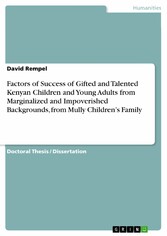Suchen und Finden
Factors of Success of Gifted and Talented Kenyan Children and Young Adults from Marginalized and Impoverished Backgrounds, from Mully Children's Family
Mehr zum Inhalt

Factors of Success of Gifted and Talented Kenyan Children and Young Adults from Marginalized and Impoverished Backgrounds, from Mully Children's Family
Doctoral Thesis / Dissertation from the year 2017 in the subject Psychology - Learning Psychology, Intelligence Research, Friedrich-Alexander University Erlangen-Nuremberg (Philosophische Fakultät und fachbereiche Theologie), language: English, abstract: This study analyzes the success factors of winning awards for individual beneficiaries and as an organization within Mully Children's Family (MCF), a Kenyan NGO for marginalized and traumatized children. The Actiotope Model is used to help analyze, and define the success factors. The Educational Capital developed and the development of Learning Capital supported by MCF as a construct is analyzed through the use of: 1) a QELC questionnaire with beneficiaries, 2) interviews of beneficiaries 3) NBLC checklist-based questionnaires for people in the support system and 4) interviews of staff and community. The Microsystems developed by the MCF construct, provide tools and well-developed Educational Capital as well as a system of coaching and nurturing to be able to enhance Learning Capital. The MCF construct is a Microsystem; it has its own compounds, schools, playgrounds and clubs, to ensure that the best Micro- and Mesosystem is created to rehabilitate and help beneficiaries effectively interact and impact the Exosystems around them, while some win awards. The success factors based on the QELC questionnaire for the award winners were determined. The three strong correlations for award winners were: 1) Cultural Educational Capital, especially as it relates to their choice to surround themselves with other high achievers within the MCF construct; 2) Organismic Learning Capital which suggests that award winners not only understand the significance of keeping their bodies healthy but also practice this; 3. Modifiability Belief, the award winners understand they have the ability to modify their behavior, learn from their mistakes and success and then modify their present actions. The impact of mentors was researched. Peers were found to play a vital role in success as well. The MCF construct intentionalizes staff-beneficiary and peer-peer mentoring. The success of MCF, which supports the modification of each beneficiary through the complex intentionalized Actiotope, is effective as can be seen by the rankings of their primary and secondary exam results and the numerous awards of individuals and teams; and also provides an environment in which marginalized members of Kenyan society have the chance to develop themselves to win awards, become entrepreneurs, and become vital members of society.
Alle Preise verstehen sich inklusive der gesetzlichen MwSt.







